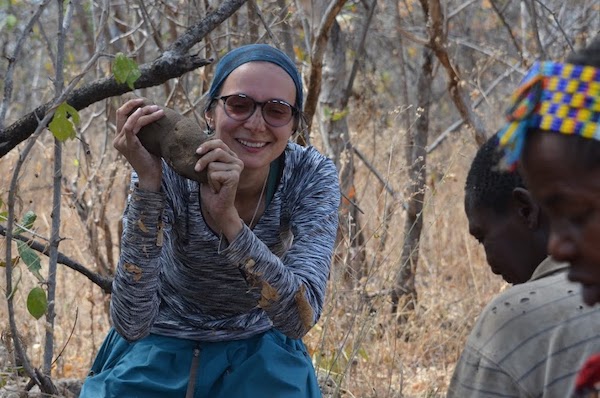Written by Nina Semushina, Anthropogeny Specialization Track Graduate Student (UC San Diego Dept. of Linguistics).
I first learned about CARTA when I just joined the graduate program in Linguistics at UC San Diego. That was the first day at the department, and CARTA graduate, Hope Morgan (now Marie Curie postdoctoral fellow at the University of Leiden), presented the program to the first-year students. I joined the program three years later after I passed my qualifying exams and took an exciting course on language evolution taught by CARTA member, Professor Robert Kluender.
Since then, CARTA was always present in my life in every aspect of it. That is why it is so hard to conceptualize that I am “reaching the end of my time at UC San Diego in the Anthropogeny Specialization Track.” First of all, the research rounds where the students meet every month and discuss new papers related to Anthropogeny. Reading papers and discussing them with people outside your immediate subfield and even discipline may seem weird before you actually start doing it. Then you realize how enriching it can be, how much more you begin to understand about your subfield when you explain it to others, and how on point can be a question about sign language phonology coming from somebody studying the microbiome.
Second, the symposia. I was fortunate to participate in those symposia that had direct relevance to my research (Impact of Early Life Deprivation on Cognition; Imagination and Human Origins; Extraordinary Variations of the Human Mind, Impact of Tool Use and Technology on the Evolution of the Human Mind) and those that had not, but were related to topics that fascinate me (Awareness of Death and Personal Mortality; CARTA 10th Anniversary). It was great to be paired with the speakers that I never imagined meeting. Being able to talk to the distinguished experts in the discipline is always enriching, but sometimes there is something more personal to it. For example, for the symposium on Extraordinary Variations of the Human Mind, I was paired with Dr. Isabelle Peretz, who studies biological foundations of music processing and music disorders. Her papers were among the first papers I ever read in English in my life - years ago, when I was an undergraduate student in Russia, learning about syntactic structures and taking my first English only class about music and language. And then suddenly, I am sitting with Dr. Peretz at the dinner, asking all the questions I had ever since.
Last but not least, is the field course in Anthropogeny in Ethiopia and Tanzania, which undoubtedly was among the most important highlights of my life – both academic and real life. Learning first-hand about fossil preparation in Addis Ababa, observing wild animals in Ngorongoro, filming baboons play and drag their little ones by the tail on the bus stop near the entrance to Serengeti, digging for tubes with Hadza (successfully!), encountering the very chimpanzees that Jane Goodall was writing about, tracking red-tailed monkeys in Issa, while following the massive stones of the watercourse and watching the swarm of butterflies to fly off the branches moved by the monkeys, buying avocados and colorful fabric at the local market, communicating in Swahili for the first time in your life is something that I will never forget. This course expanded my view on how communication can be studied – and what a scientist can do. I don’t know if I will ever end up in the field, studying animal communication in relation to the evolution of language (although this perspective seems very tempting!). Still, if it happens, the field course in Tanzania would be the inspiration.


